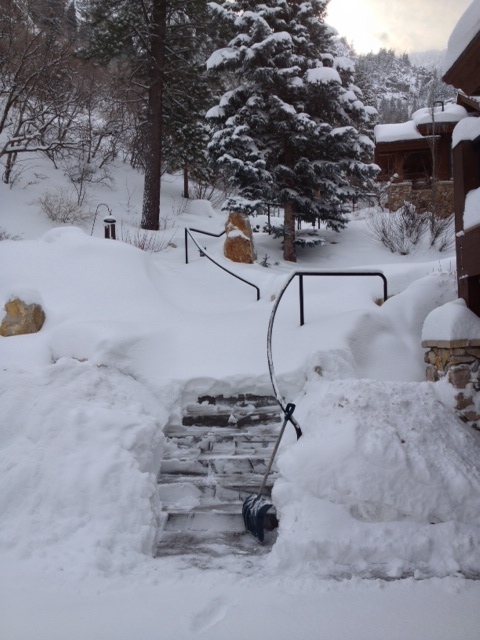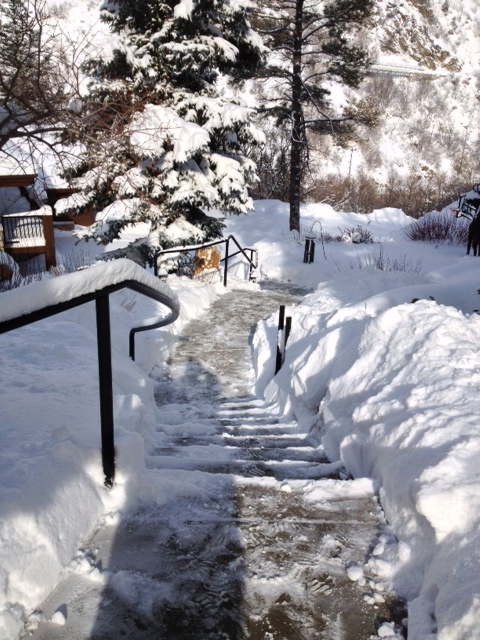Here is another video from Japan talking about how to help move children along the road to independence and become a successful adult. In my previous post I talked about how children learning to take care of their personal and self-help needs and learning to be responsible for chores is vital to their development and independence. Now let’s look a step further.
From everything I can discover, our country is a much safer place than it was 50 years ago; however, because of national media attention most people feel it’s getting more dangerous every year. We as parents are being pressured to feel and believe that the world is really dangerous and that our children shouldn’t be permitted to play alone in their front yards, let alone walk down the street to a park, or heaven forbid, walk to school by themselves. Times certainly are a-changing.
I grew up right outside of the city limits of Philadelphia in a rather typical 1950’s suburban neighborhood. Our house happened to sit on a highway, US route #1, a very busy road that happened to sit at the intersection of another busy road. I prided myself in my ability to wake in the middle of the night from a deep sleep at the sounds of tires squealing and get to my window in time to see the cars actually crash. My sister and I walked to school along and across that highway for one mile every day, starting with kindergarten, as did every other kid in the area.
At the age of eleven I started a snow removal business, having contracted with many of the families and a few businesses in the area and having hired a couple of my friends to work for me. On school nights if it was supposed to snow, I would stay up and wait for the snow and would hit the streets as soon as it started coming down, often working from two or three am until it was time to go to school. My parents were proud of my initiative, and if they had anxiety over my being out on the streets in the middle of the night, I never knew it. I suspect they might have had a twinge or two of apprehension; but if they did they kept it to themselves.
Before I start getting hate mail, let me say that I’m not suggesting that you let your kids go out by themselves and roam the streets in the middle of the night, or that you have your seven-year-old daughter take a couple of trains by herself though a busy city to get to school. But I am saying that as parents we need to look for opportunities for our kids to do things independently and take some journeys.
I’ve had a number of occasions during my meetings with kids and their parents to challenge and push the parents. When traveling to our chapters, I often do evaluations out of suites in hotels and more often than not, Embassy Suites hotels. Most of these hotels have fewer than ten floors of rooms built around a central atrium, with glass front elevators at one end. Riding the elevators is often the highlight of the child’s trip. While working out of these hotels, I have on many occasions encouraged a parent with a teenage child with perhaps Down syndrome or one on the autism spectrum or even learning or attention problems to let their child go down to the lobby and retrieve the other parent. Often the suggestion is met with shock. The child wasn’t shocked, the parent was. To put this into perspective, because of the layout of the hotel you could watch the child go down the hallway, into and down the elevator, and even look down and watch them in the lobby. It should also be mentioned that during the day when we are doing the evaluations, the hotel is pretty much empty. As many times as I have done this, I’ve never had a child have the least bit of an issue. They listened to the directions, followed the directions, and just did it. The problem wasn’t with the child; it was with the parent.
We need to give our children the opportunity to do things independently to teach them independence. Independence teaches confidence, self-reliance, and initiative, all very important, very necessary lessons for all children, whether typical or special needs.
Lest you think that I just talk the talk and don’t walk the walk, my son, Laird, who now at 27 basically runs daily operations at NACD, was hauling 40-pound bales of hay to our Scottish Highland cattle first thing in the morning, in the dark, through the snow, often at temperatures below zero by himself at the age of 5. He didn’t need to be pushed or prodded or given candy as a reward, it was simply one of his jobs and he was proud to do it. He is better for the experience.
As parents, each of us needs to look at our children and evaluate their capabilities, determine what challenges they can handle, and let them go. It’s part of our job.

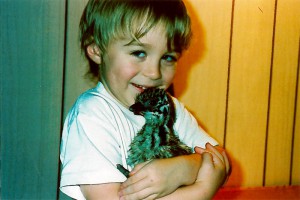 Yep, it’s true. Those are emus; they are in the Utah mountain snow, not in the Australian outback; and that little guy is my son, Laird, who was about five at the time. He was shoveling paths to the bird pens so we could get them food and water and hopefully gather their eggs before they froze. We really liked collecting those big green eggs, which we incubated and hopefully hatched into chicks. Back then those chicks were worth about $5,000 each. (I bet you thought I was crazy. As they say, “like a fox.”) In one of the chapters in my life I was a child developmentalist/rancher and raised emus and other exotic critters in the mountains of Utah. It was great fun, a family learning experience, adventure, a particularly great opportunity for my younger son Laird and fortunately generally financially rewarding, helping to support my work with kids. Laird learned about chores early and loved not only being a “helper,” but learning to assume responsibility and not to fear big tasks–Herculean tasks.
Yep, it’s true. Those are emus; they are in the Utah mountain snow, not in the Australian outback; and that little guy is my son, Laird, who was about five at the time. He was shoveling paths to the bird pens so we could get them food and water and hopefully gather their eggs before they froze. We really liked collecting those big green eggs, which we incubated and hopefully hatched into chicks. Back then those chicks were worth about $5,000 each. (I bet you thought I was crazy. As they say, “like a fox.”) In one of the chapters in my life I was a child developmentalist/rancher and raised emus and other exotic critters in the mountains of Utah. It was great fun, a family learning experience, adventure, a particularly great opportunity for my younger son Laird and fortunately generally financially rewarding, helping to support my work with kids. Laird learned about chores early and loved not only being a “helper,” but learning to assume responsibility and not to fear big tasks–Herculean tasks.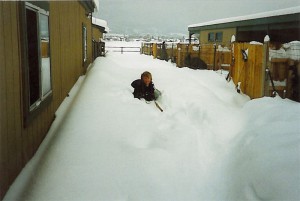 One of my favorite memories involves the building of our home and developing our ranch. Shortly after we moved into our new home, two landscapers were coming up to put in a sprinkler system around the house. They would arrive early, like 6:30 a.m., to begin work. When they arrived Laird would be waiting for them with his little wheelbarrow and shovel, ready for work; and work he did. I have no doubt that those guys worked harder and faster than ever because they had this little kid pushing right beside them, never wanting a break. When the system was almost complete, the last guy on the job was putting the final pieces together in the in-ground control box. Three-year-old Laird couldn’t help with that task, so he on his own accord went and found his little folding chair, one of his reading books (“Bibs”), set the chair up next to where the guy was working, sat there, and read the entire book to him. If he couldn’t help, he could entertain.
One of my favorite memories involves the building of our home and developing our ranch. Shortly after we moved into our new home, two landscapers were coming up to put in a sprinkler system around the house. They would arrive early, like 6:30 a.m., to begin work. When they arrived Laird would be waiting for them with his little wheelbarrow and shovel, ready for work; and work he did. I have no doubt that those guys worked harder and faster than ever because they had this little kid pushing right beside them, never wanting a break. When the system was almost complete, the last guy on the job was putting the final pieces together in the in-ground control box. Three-year-old Laird couldn’t help with that task, so he on his own accord went and found his little folding chair, one of his reading books (“Bibs”), set the chair up next to where the guy was working, sat there, and read the entire book to him. If he couldn’t help, he could entertain.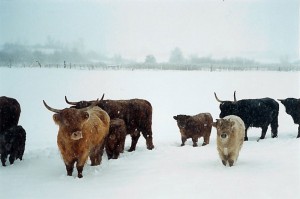 Laird happily requested more and more jobs on the ranch. The young emus needed to be exercised to strengthen their legs, so Laird would run up and down the chick pens with these three-four foot tall chicks/creatures often towering over him. (If you haven’t seen an emu up close, they have big, clawed feet and look more like velociraptors than birds.) When he was a bit older he would be out before daylight in below zero weather, dragging forty-pound bails of hay out to our Scottish Highland cattle. He did these chores willingly, always looked for more, and was justifiably proud of himself and his achievements. Teaching our children to take care of themselves is huge. Raising children to be adults requires more than teaching them the “three Rs;” we need to teach them to be “highly capable.” I know of families whose children don’t know how to do their laundry, buy or prepare food, or clean their living space; who don’t understand the value of money nor how to be responsible; and yet they are sending them off to expensive colleges. Their odds of success are not great.
Laird happily requested more and more jobs on the ranch. The young emus needed to be exercised to strengthen their legs, so Laird would run up and down the chick pens with these three-four foot tall chicks/creatures often towering over him. (If you haven’t seen an emu up close, they have big, clawed feet and look more like velociraptors than birds.) When he was a bit older he would be out before daylight in below zero weather, dragging forty-pound bails of hay out to our Scottish Highland cattle. He did these chores willingly, always looked for more, and was justifiably proud of himself and his achievements. Teaching our children to take care of themselves is huge. Raising children to be adults requires more than teaching them the “three Rs;” we need to teach them to be “highly capable.” I know of families whose children don’t know how to do their laundry, buy or prepare food, or clean their living space; who don’t understand the value of money nor how to be responsible; and yet they are sending them off to expensive colleges. Their odds of success are not great.